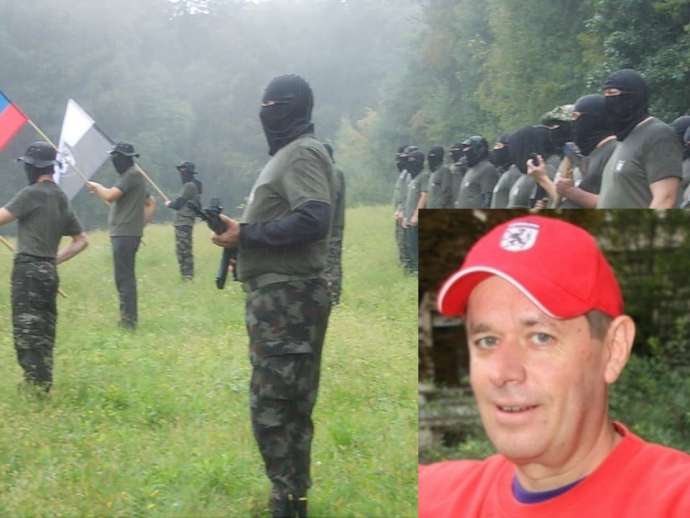Our earlier stories on this case can be found here
STA, 29 March 2019 - Andrej Šiško, the self-styled leader of a militia called the Štajerska Guard, has been sentenced to eight months in prison for trying to subvert the constitutional order. Matej Lesjak, charged with aiding Šiško, received a three-month suspended sentence. The ruling is not final yet.
The sentence was handed down by the Maribor District Court on Friday after a trial that lasted only five weeks on the first ever charges brought for the crime of inciting to a violent subversion of the constitutional order.
Judge Vanja Verdel Kokol ordered that the 49-year-old Šiško be released from custody today after more than six months in detention. The time he has spent in detention will count as part of the sentence.
According to the judge, Šiško attempted to subvert the constitutional order with various moves, including by threatening the then Prime Minister Miro Cerar in January 2017 and founding the Štajerska Land and then a para-military unit, the Štajerska Guard, in September 2018.
Verdel Kokol said Šiško had gone too far and that history thought us that such actions must not be underestimated.
She noted that the defendants started claiming the whole thing was but a provocation only after criminal procedure had been filed against them.
"A democratic society should not be taken for granted and it can be jeopardised. This is why clear boundaries must be set to prevent undermining its foundations."
Šiško, the leader of the non-parliamentary United Slovenia Movement, and Lesjak, a former member of the opposition Democratic Party's (SDS) youth wing were apprehended in September after a video was posted on social media of a para-military group parading with airsoft rifles in the woods in north-east Slovenia.
While Šiško is considered to have organised the exercise, Lesjak is believed to have filmed it and posted the video on the internet.
Both claimed the campaign was but a provocation designed to bring to the public's attention the problematic workings of Slovenia's politics, mass media and security system.
Bot the judge dismissed this, wondering why Šiško had gathered information about the militia members' blood type if it was all a joke.
The state has a monopoly over national security and there is no space for para-military groups. "Incitement to a violent subversion of the constitutional order may encroach on the fundamental rights of Slovenian citizens," she said.
According to the judge, the intention of the exercise was to spread ideas propagated by Šiško in order to attract more followers angry with the current government.
It is therefore unimportant whether they carried real weapons; even display of weapons similar to real weapons achieved its purpose, the judge said.
Šiško, reacting in his signature fashion, said the ruling confirmed that Štajerska had been established as an independent land. He now expects a meeting with the prime minister and home minister to set down the details of his militia's cooperation with the police and the army.
He also rejected the notion that he incited to violence, "but what others understand is another thing altogether. I speak Slovenian, but obviously the prosecutor and the judge have trouble understanding."
The prosecutor had proposed that Šiško spent 16 months in prison - the maximum sentence would be five years - but was nevertheless satisfied with the sentence. The defence said the ruling was expected.
Šiško's lawyer, Lucija Šikovec Ušaj, framed the trial in free speech terms, arguing that Slovenia will have to come clear once and for all about whether people have the right to free speech.
"If they say we don't, we'll have to stick to it. Such dictatorships do not last long, though. It is true, however, that Europe is gravitating towards limiting free speech and the judge has joined this bandwagon," she said.
The five-week trial saw a fair share of unusual scenes, from Šiško spending days delivering his defence to his supporters at one point appearing in front of the Maribor Courthouse with a white stretch limo to salute their leader.
Šiško, the leader of the far-right party United Slovenia, has long been active politically and he even ran for Maribor mayor from detention in the November 2018 local elections, securing 1.43% of the vote.
He has also announced his intention to stand in the May elections to the European Parliament, while his lawyer Šikovec Ušaj is among the founding supporters of a new far-right party, the Homeland League, which plans to field her in the EU election.







